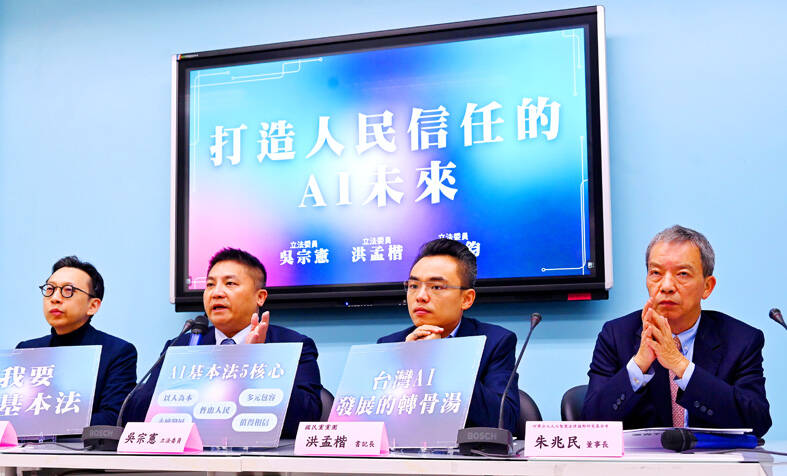Chinese Nationalist Party (KMT) legislators yesterday proposed a draft artificial intelligence (AI) basic act for the development of AI technology.
The EU on Wednesday last week passed the AI Act — the first legal framework for the technology, KMT Legislator Wu Tsung-hsien (吳宗憲) told a news conference held together with the International Artificial Intelligence and Law Research Foundation.
Taiwan should create an AI basic act that would provide a legal basis for the creation of an AI system with distinct Taiwanese characteristics, Wu said.

Photo: Liu Hsin-de, Taipei Times
The draft act aims to alleviate fears that AI would replace humans in the workplace and encourage the public to embrace AI as a useful tool, he added.
Wu said his understanding of AI technology helped him when he worked as a prosecutor, especially regarding financial crime, adding that AI would also benefit the healthcare and transportation sectors.
“Only by getting to know and embracing AI can we maximize the benefits we can obtain from this new technology,” Wu said.
As AI technology has changed many things and provides benign responses, it is necessary to help the public to understand and embrace the technology in an appropriate manner, KMT Legislator Hung Meng-kai (洪孟楷) said.
The KMT’s legislative caucus worked with experts to develop the draft act and would strongly advocate for its passage on the first reading, Hung said.
Hung urged the Executive Yuan to propose its own separate version of the draft as soon as possible.
He also called on the Democratic Progressive Party to recognize the technological trend, saying that, if passed, the act would facilitate industrial upgrades, increase penalties for technological crimes and improve personal information protections.
Regardless of whether the future lies in AI, the government must introduce legislation for AI systems to facilitate their growth and regulate them, KMT Legislator Ko Ju-chun (葛如均) said.
Taiwan used to be a pioneer in the tech sector, but is lagging severely in terms of AI, Ko said, adding that the draft aims to guarantee human rights and boost industrial development.
The draft provides restrictions, but is not meant to suppress development, Wu said, adding that the aim of it is to form the legal basis for AI development and increase Taiwan’s international influence in the AI industry.

US President Donald Trump said "it’s up to" Chinese President Xi Jinping (習近平) what China does on Taiwan, but that he would be "very unhappy" with a change in the "status quo," the New York Times said in an interview published yesterday. Xi "considers it to be a part of China, and that’s up to him what he’s going to be doing," Trump told the newspaper on Wednesday. "But I’ve expressed to him that I would be very unhappy if he did that, and I don’t think he’ll do that," he added. "I hope he doesn’t do that." Trump made the comments in

NOT AN OPENING: Trump’s violation of international law does not affect China’s consideration in attacking Taiwan; Beijing lacks capability, not precedent, an official said Taiwanese officials see the US’ capture of the president of Venezuela as a powerful deterrent to Beijing’s aggression and a timely reminder of the US’ ability to defeat militaries equipped with Chinese-made weapons. The strikes that toppled Venezuelan President Nicolas Maduro signaled to authoritarian leaders, including Chinese President Xi Jinping (習近平), US President Donald Trump’s willingness to use military might for international affairs core to US interests, one senior official in Taipei’s security circle said. That reassured Taiwan, the person said. Taipei has also dismissed the idea that Trump’s apparent violation of international law could embolden Beijing, said the official, who was not

A cold surge advisory was today issued for 18 cities and counties across Taiwan, with temperatures of below 10°C forecast during the day and into tonight, the Central Weather Administration (CWA) said. New Taipei City, Taipei, Taoyuan and Hsinchu, Miaoli and Yilan counties are expected to experience sustained temperatures of 10°C or lower, the CWA said. Temperatures are likely to temporarily drop below 10°C in most other areas, except Taitung, Pingtung, Penghu and Lienchiang (Matsu) counties, CWA data showed. The cold weather is being caused by a strong continental cold air mass, combined with radiative cooling, a process in which heat escapes from

Snow this morning fell on Alishan for the first time in seven years, as a strong continental cold air mass sent temperatures plunging across Taiwan, the Central Weather Administration (CWA) said. The Alishan weather station, located at an elevation of about 2,200m in central Taiwan, recorded snowfall from 8:55am to 9:15am, when the temperature dropped to about 1°C, the CWA said. With increased moisture and low temperatures in the high-altitude Alishan area, the conditions were favorable for snow, CWA forecaster Tsai Yi-chi (蔡伊其) said. The last time snow fell at the Alishan weather station was on Jan. 10, 2018, while graupel fell there